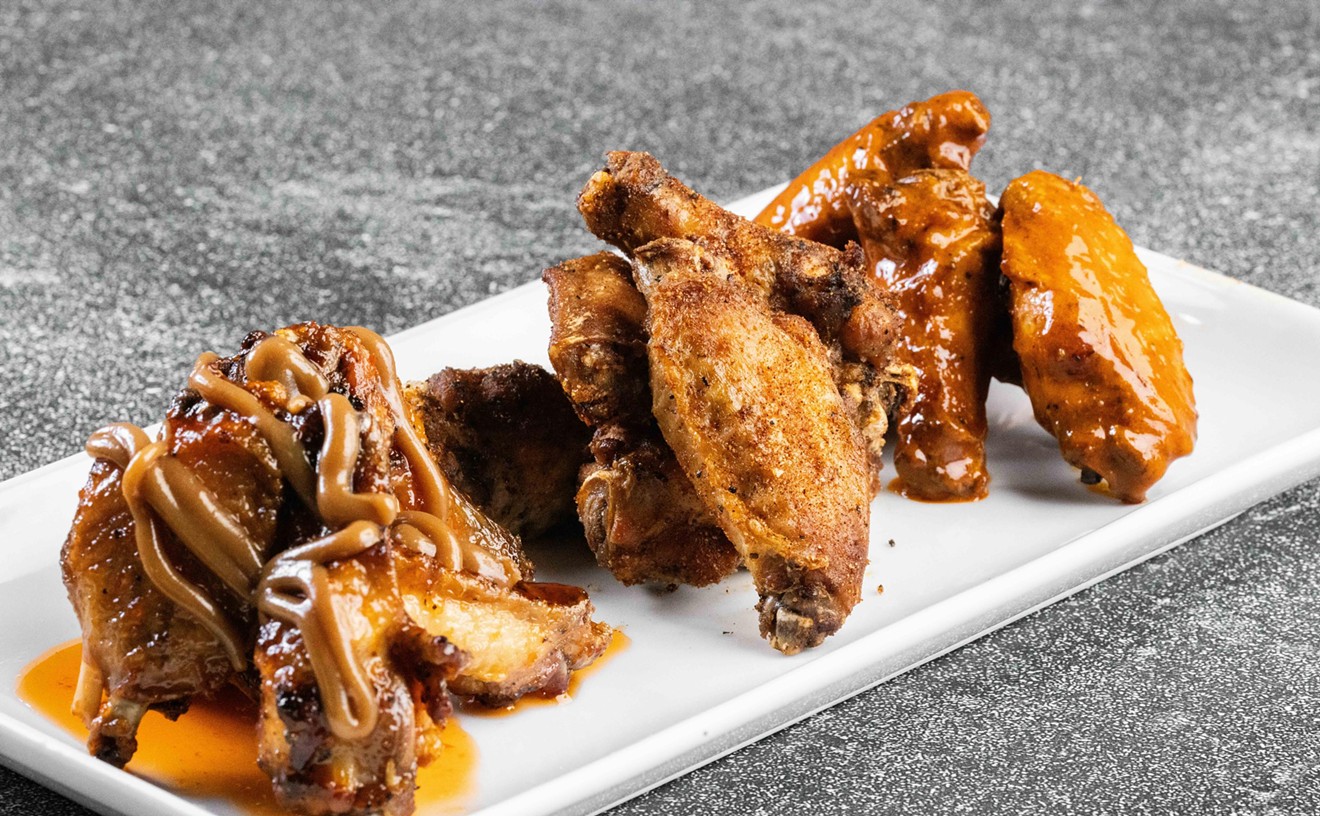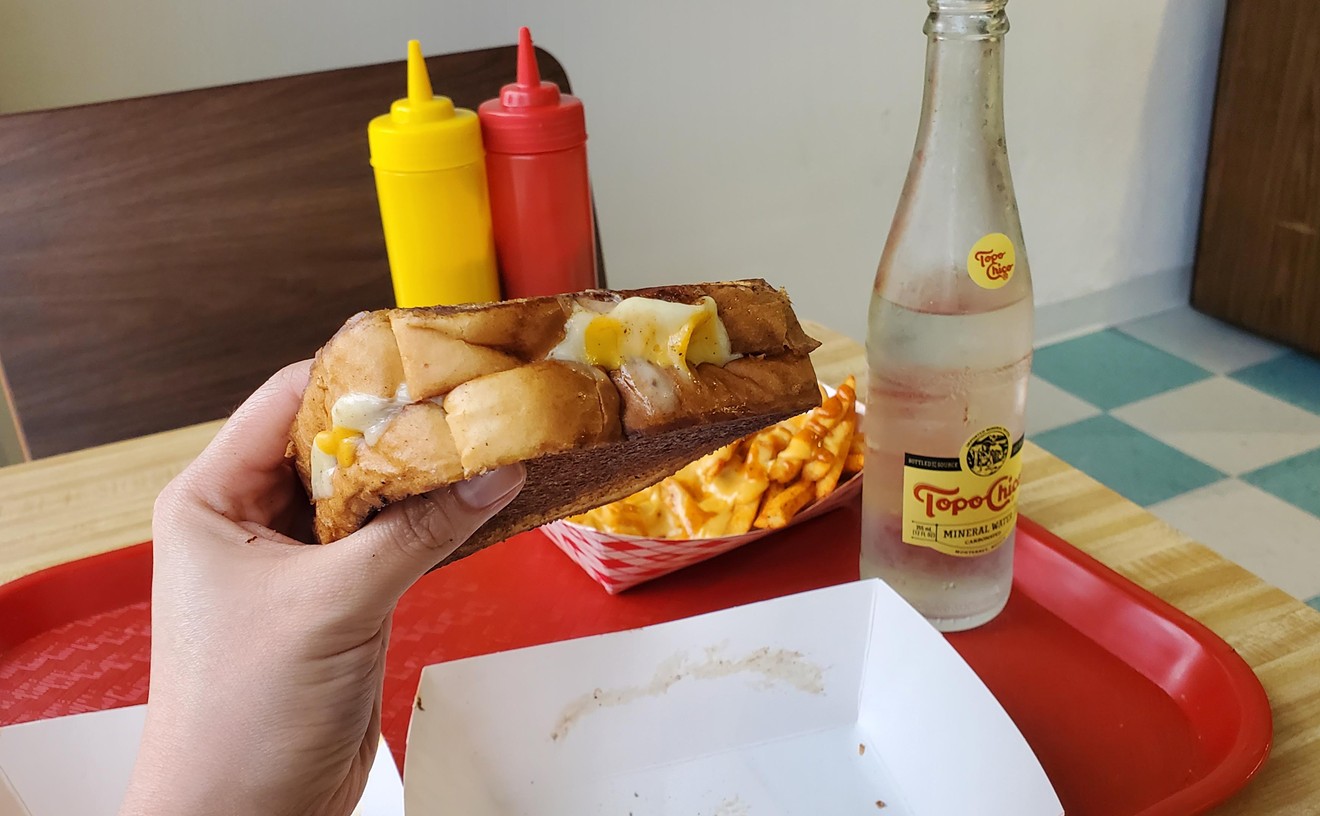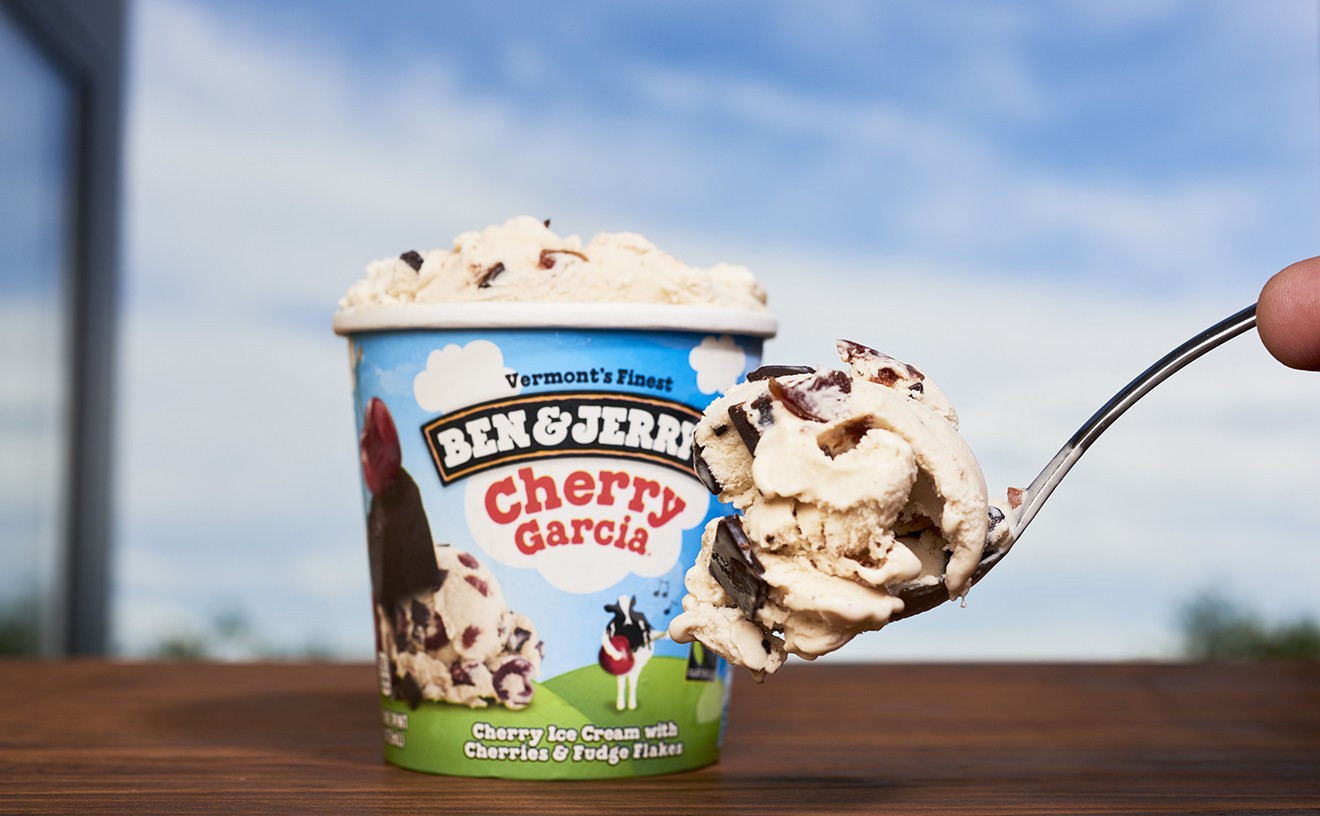Greene says she's always been deeply stirred by her city -- originally founded as the Aztec capital Tenochtitlán in 1325 -- and she's devoted herself to preaching its sophistication and culinary acuity. "It's the most incredible city for about five days," she says. "I don't know what you'd do after that."
Five days is maybe all that any self-respecting Dallasite hurtling through life in a Lexus could handle. Mexico City is congested. It's poor. And it has air pollution that could choke Zeus -- if he were the type of deity given to frequenting former Aztec municipalities. The smog (maybe with a bow to Aztec architecture) even inspired one of Ciudad's desserts: Edificio Ciudad chocolate mousse ($7). The thing is an architectural marvel, with a trio of long, narrow triangular plates made of fried chocolate cookies pocked with bits of almond. It rises 8 inches like some quasi-pyramid. Near the apex, a loop of spun sugar hovers like a halo. This shimmering amber ring is supposed to simulate Mexico City's dirty fog; the cookie construction, the ascent of a skyscraper into its puffy depths. Diced mango, strawberry, and whole blueberries crowd near the base of the structure, like so many harried pedestrians. Pull back these crisp, airy plates, and you'll find a swirl of rich, smooth mousse.
Greene says her dream of crafting a true Mexico City restaurant has been simmering for years. She even chose her chef years ago: former Fairmont Hotel banquet chef Joanne Bondy. But Bondy would have none of it. Instead she left Dallas to fiddle at the Arizona Biltmore Resort and Spa in Phoenix before moving on to casino mogul Steve Wynn's Beau Rivage Resort and Casino in Biloxi, Mississippi.
But Greene finally got her to swallow her vision to create a Mexico City dining replica in Dallas. To seal the deal, she made Bondy a partner in the venture. For several weeks the pair traveled through Mexico City, touring restaurants and bars, sampling the cuisine, supping the city's pace and pulse. "I really got to capture what Mexican cuisine really was," Bondy says. "I was so familiar with Southwestern, Tex-Mex, border-style cuisine. And I thought, 'Wow, this is something that nobody has seen.'" Bondy says she was struck by everything in the restaurants in Mexico City, from the freshness and detail on the plate to the service and the architecture. There she found brilliantly simple blends of flavors, layers that were ample but never overwhelming. One of those layers is vanilla bean, which Bondy and Greene insist works wonders on seafood.
It's a subtle thing, and I don't know how it works, but work it does. Take Ciudad's ceviche ($9) -- hands down the best collection of diced and marinated sea life you'll find anywhere in Dallas. Served in a margarita glass, the scraps of octopus, conch, and shrimp -- their natural sweet leanings tugged and nudged by vanilla -- were firm and supple. But it's the understated collision of flavors that makes this urn of chopped flesh so provocative. Key limes and their subtle acids make hay with cilantro, diced tomato, papaya, pineapple, and mango. But what really kicks some ass in this concoction is the clump of pink onion, pickled in brine and orange juice, scattered over the top. It adds a jagged edge of raciness to a melding that's almost too smooth for its own good.
Yet the bean treatment utterly fails to add anything to the poblano ravioli ($19.50) with sautéed vanilla shrimp, perhaps the weakest dish on what is almost uniformly a formidable menu. The shrimp, though flavorful, were a little mushy. The ravioli, stuffed with poblano peppers and cheese, were dry, gummy and void of suppleness. Bondy defends that, in Mexico City, pasta is not cooked "al dente," or until it offers a slight resistance when bitten. Pasta there is overcooked. This might be fine in Mexico City, but this is Dallas, and while it may not overflow with great Italian, it still knows when its noodle has been cooked to excess.
Yet even if this ravioli were cooked to a more approachable texture, it still may not have worked. That's because the raja sauce, a thing rendered from sun-dried tomato, cream, and shrimp stock, was shy on spark and arrived with a wrinkled layer of skin over the surface, not the kind of fit and finish becoming of one of the most expensive entrées on the menu.
Everywhere else fit and finished seemed paramount. Clay-pot-baked sea bass ($19) with nopales (cactus leaves), tomatoes, capers, olives, and laurel rice pilaf sounds cluttered. And it is. Parked on an aromatic hoja santa leaf (an anise-scented herb), the sweet, firm fish merged seamlessly with the surging brininess of green olives and capers, sparking the puddle of fish juices pooled in the bottom of the pot. Of the almost uncountable sea-bass renditions surfacing on menus, this cluttered pot fish was particularly noteworthy, not to mention damn good.
Then there's the braised salmon ($19), another fish parked in a clay pot. This fish is seared, drubbed with a thick brushing of mole verde, and braised. The meat, again placed on a hoja santa leaf, was fluffy, flaky, succulent, and suffused with a gentle earthen flavor. Not so for the side of masa dumplings, which were dry, doughy, and pasty.
Still, this fish in a pot falls right in line with what Greene trumpets as her goal with this restaurant. "What I'm trying to do with Mexican food is to give it the credit it deserves, to put it, for once and for all, at a level where it is appreciated," she insists. "We needed to make sure people didn't find an excuse to bring down our food."
Excuses would be hard to find here, even if you scoured the dark, slightly bordelloish cigar bar with overstuffed leather chairs and sofas and red window treatments equipped with tassels.
Actually, the space hasn't changed all that much from when it was Zeitgeist Café. The whitewashed wood treatments on the door frames and windows remain. The same patio furniture is there, as are the floors.
But it feels completely different: harmony dressed in cozy little flirts with decadence. Glass elements, little bowls with corkscrew tails, repeat color variations from the chandelier in the entryway. Single blue lighting units dangle over the bar, and a gangly lighting unit near the bar looks like a Martha Stewart interpretation of a food-borne virus -- if Martha Stewart were any fun, that is.
The menu, a concise sheet, is delivered in a heavy copper slipcover. Maybe it doubles as a server swatter if the service slips, which it never does, but it's nice to keep those ancillary uses in mind.
While you won't be rewarded with a basket of chips and salsa when you sit down unless you request them, Ciudad does serve a number of items that Dallas diners will be comfortable with. Chicken tacos ($5), delicious little things, are served with a two-ply layer of corn tortilla disks: one blond, one ruddy from chili powder. A tangle of shredded chicken, sparked with marjoram, achiote, garlic, and pickled onion, was gently spread over the tortillas and topped with cheese.
Pescado tacos ($6) came up short by comparison. Fried pillows stuffed with white fish and salsa cascabel (a dried blood-red chili pepper), these pockets were gummy and ripe with a strong fishy taste -- unfortunately, the only flavor that grabbed the palate.
As the armor-plated menus attest, presentation is important here. A trio of long duck flautas ($8) were fried to a coffee hue, bundled and tied with a strand of corn husk. Crisp, with a slightly bitter taste that was blunted a bit by the moist, slightly sweet interior, the only drawback was that these flautas were slightly greasy.
You perhaps wouldn't expect to slurp chunky chicken-vegetable soup ($6) in a Mexican restaurant. But Ciudad's version was as hearty as it was clean and busting the bowl with subtle flavor. Generous pieces of carrot, Mexican squash, potato, leeks, garbanzo beans, and wedges of avocado crowned with cheese and strips of tortilla made for a soup that was simultaneously clean, clear, and cluttered.
Perhaps the best thing on the menu was pork. Not a greasy, cheesy, bean-pummeled thing, but pork tenderloin ($17) wrapped in a banana leaf and then seared and roasted. The meat was sweaty and smooth. And it was potently flavored, no doubt from the achiote paste and that splash of bitter orange juice. The sauce was good too, formulated from pork drippings, the orange juice, and a little mole to pump up the favor.
Lamb chops ($23) were two pairs of chops interlaced in a clash of bone, flesh, and flavor, though the cumin they were purportedly crusted in was evident in only the subtlest of tones. The accompanying batch of fennel salsa, sweetened with roasted fennel nodes freshened with a toss of pico de gallo, proved as brisk as it was satisfying. Then there's a thing called cotija ancho masa tossed onto the plate: a cake of pureed hominy sauced with ancho chili. It was moist, firm, and musky -- sexily nurturing.
Which is what Ciudad is, really. It bristles with an edgy sensuality that threatens to throw you just before it nuzzles in and soothes you. Whatever Greene set out to do with her dream of lavishing authentic Mexican food with "the credit it deserves."










